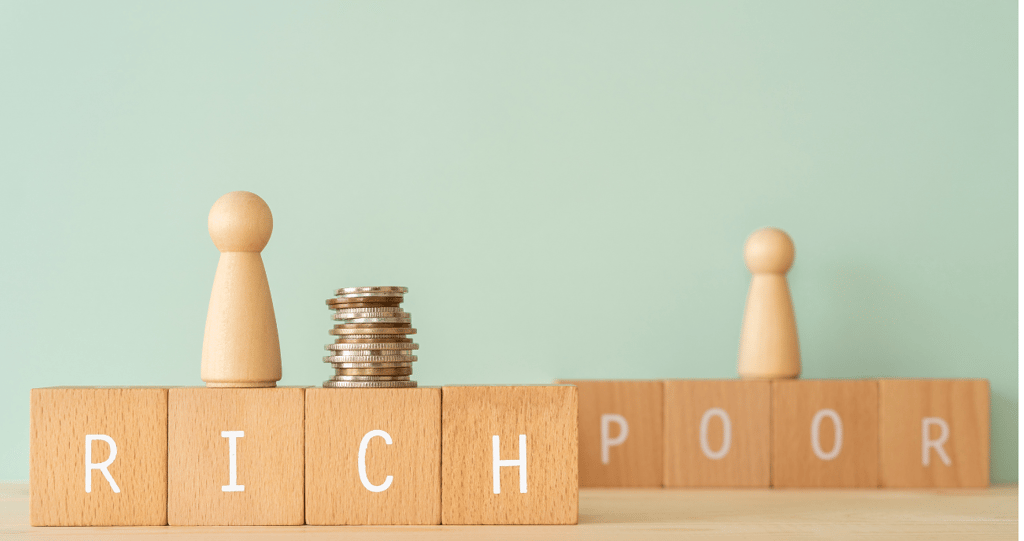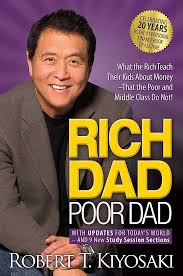Your support through our carefully selected affiliate links helps us keep the blog thriving — at no extra cost to you.
Review: "Rich Dad Poor Dad"
Hello fellow readers. Welcome to the blog, today I'd like to review a book I enjoyed reading recently. "Rich Dad Poor Dad" by Robert Kiyosaki is a book that has captured the attention of millions worldwide with its unconventional approach to personal finance and wealth-building. In this comprehensive review, we'll take a deep dive into the key concepts, lessons, and criticisms of Kiyosaki's seminal work.
Introduction: The Story Begins. Kiyosaki opens the book with a captivating narrative about his childhood, contrasting the financial teachings of his two father figures: his biological father (the "poor dad") and his friend's father (the "rich dad"). This sets the stage for the fundamental theme of the book – the stark differences in mindset and approach between those who achieve financial success and those who struggle financially.
Chapter 1: The Rich Don't work for money. One of the central ideas in "Rich Dad Poor Dad" is the importance of shifting one's mindset from an employee mentality to an investor mentality. Kiyosaki challenges readers to break free from the traditional notion of working for money and instead encourages them to make money work for them through investments and passive income streams. This mindset shift is fundamental to achieving financial independence and escaping what he calls the"rat race."
While reading the chapter this old saying: "No one is coming to save you!", kept coming to mind. Oftentimes we fall into this passive mindset where we believe or hope that the things we want will somehow just come to us without us having to fight for them. That someone will come and give us that life we dream about, or worse we blame everyone else for our own problems. We need to realise that, no one is coming to save us from our problems or from the life we seek to be freed from, that we are the heroes of our own stories, and that if we want victory we have to conquer it ourselves.
Chapter 2: Why Teach Financial Literacy Kiyosaki emphasises the significance of financial education, arguing that traditional schooling often fails to teach essential money management skills. He advocates for self-education and continuous learning in areas such as investing, entrepreneurship, and asset acquisition. By expanding one's financial intelligence, individuals can make informed decisions and navigate the complex world of money more effectively. Rapper 'Notorious B.I.G', once famously said: "Mo money, mo problems!". The truth is money doesn't really solve problems, education and intelligence do. Lottery winners often learn this lesson too late.
Chapter 3: Mind Your Own Business. A key concept introduced in "Rich Dad Poor Dad" is the distinction between assets and liabilities. Kiyosaki defines assets as income-generating investments that put money in your pocket, such as real estate, stocks, and businesses. In contrast, liabilities are expenses that take money out of your pocket, such as mortgages, car payments, and credit card debt. He advises prioritising the acquisition of assets and minimising liabilities to build wealth over time.
Chapter 4: The History of Taxes and the Power of Corporations. One of the most compelling ideas in the book is the concept of passive income – money earned with little or no active effort. Kiyosaki advocates for creating multiple streams of passive income through investments, rental properties, royalties, and business ventures. This passive income provides financial stability and freedom, allowing individuals to pursue their passions and live life on their terms. This chapter on passive income is incredibly significant to me on a personal level. It's a topic I intend to delve deeper into in a separate blog post. The idea of making money work for you, and most importantly, the freedom that comes with passive income, is pivotal. It allows you to prioritise what truly matters, such as family and loved ones, especially if you're still navigating your purpose in life.
Chapter 5: The Rich Invent Money. Kiyosaki addresses the common fears and doubts that hold people back from achieving financial success. He encourages readers to embrace failure as a learning experience, take calculated risks, and step out of their comfort zones and not only that but to educate themselves on the rules of the money game so they can spot the right opportunities. By overcoming fear and taking decisive action, individuals can move closer to their financial goals and create lasting wealth.
Chapter 6: Work To Learn - Don't Work For Money. In "Rich Dad Poor Dad," Kiyosaki extols the virtues of entrepreneurship as a path to financial freedom. He emphasises the importance of creating value, solving problems, and serving others through innovative business ventures. Kiyosaki's own entrepreneurial journey serves as inspiration for readers looking to start their own businesses and create wealth on their terms. He reflects on his decision to leave several promising jobs, emphasising that he had absorbed enough knowledge to embark on his entrepreneurial journey. He underscores the significance of having a broad understanding across various domains, highlighting it as crucial to steer clear of the 'rat race' trap. Often, adding one skill to your toolbox can propel you to the life of financial freedom you dream about.
Chapter 7: Overcoming Obstacles. Real estate investing is a cornerstone of Kiyosaki's wealth-building philosophy. He believes that real estate offers numerous advantages, including passive income, tax benefits, leverage, and appreciation potential. Kiyosaki provides practical advice on acquiring investment properties, managing tenants, and leveraging financing to maximize returns. In this section, Kiyosaki delves into the common obstacles that hinder financially savvy individuals from accumulating assets, such as fear, cynicism, laziness, bad habits, and arrogance. He stresses the importance of effectively managing fear and risk, emphasising that courage isn't the absence of fear but rather the ability to take action despite it.
According to Kiyosaki, in the realm of finances, it's often the bold who emerge victorious, not necessarily the smart. However, this chapter is likely to draw criticism, as Kiyosaki simplifies complex concepts, implying that the attitudes and behaviour he discusses are equally simple, which isn't always the case. While some "bold" individuals may have taken risks and succeeded, many others have suffered financial ruin, negatively impacting their families. Additionally, on this road to wealth, what some perceive as cynicism may be easily viewed as prudence by others.
Chapter 8: Getting Started.
Throughout the book, Kiyosaki stresses the value of financial intelligence – the ability to understand and navigate the financial world effectively. He encourages readers to educate themselves on topics such as accounting, investing, taxes, and asset protection. By developing financial intelligence, individuals can make informed decisions and avoid common pitfalls on the path to financial freedom.
In this chapter, I find myself in stark disagreement with Kiyosaki's assertion that society teaches us that the love of money is the root of all evil, citing 1 Timothy 6. It's not that I dispute the truth of this biblical verse; rather, I take issue with the notion that we're explicitly taught that loving money will inevitably lead to evil in our lives. In my view, the disdain some harbor towards wealthy individuals, while secretly longing for wealth themselves, stems more from envy than from any deeply held moral convictions. Often, the way people discuss these matters suggests to me that they perceive the problem to lie within money itself, rather than in our attitudes towards it, as the Bible suggests.
For me personally, money represents the freedom to pursue and invest myself in the things that really matter to the human spirit, your purpose. The eternal things that bring fulfilment and a joy that does not depend on your circumstances in life. To have total control over my time and location. When you spend your life in the pursuit of money for money's sake that's when you welcome evil. When you start loving money itself and using people, instead of using money and loving people, that's when you invite disaster into your life.
Chapter 9: Still Want More? Here Are Some TO Do's. While "Rich Dad Poor Dad" has garnered widespread acclaim, it has also faced criticism and controversy. Some critics question the accuracy of Kiyosaki's personal anecdotes and the feasibility of his investment strategies for everyone. Others raise concerns about the book's emphasis on risk-taking and its potential to mislead inexperienced investors. It's important for readers to approach the book critically and adapt its teachings to their own circumstances and risk tolerance. I often say, if you want advice, ask someone who has what you want, or is doing what you want to do. Those are the best people to give life changing education. Obviously, Robert Kiyosaki is not perfect and he is trying to sell you his book, that being said you should definitely read it and evaluate for yourself what to apply and what not to apply to your particular circumstances, if at all. One thing for sure you won't be worse off than you are by reading "Rich Dad Poor Dad".
Chapter 10: Final thoughts. Ultimately, I interpret Kiyosaki's message as a call to embrace a new mindset if we desire financial freedom. He suggests that relying solely on traditional methods like hard work and saving may not suffice in today's rapidly evolving economy. Instead, he advocates for prioritising financial literacy and boldness by taking calculated risks in order to generate wealth in this dynamic economic landscape. Kiyosaki implies that amidst chaos lies opportunity, encouraging us to seize these moments to pave our path to financial success.
Kiyosaki's insights on mindset, education, asset acquisition, passive income, entrepreneurship, and financial intelligence provide a road-map for individuals looking to build wealth and create a secure financial future. While the book is not without its controversies, its impact on millions of readers worldwide cannot be denied. Whether you're a seasoned investor or just starting on your financial journey, "Rich Dad Poor Dad" has valuable lessons that can inspire and empower you to take control of your financial destiny.
Reading "Rich Dad Poor Dad" made me think about how I have a bias toward thinking that doom can be likely only through an action but never through inaction. That not doing anything is safer than doing something, which oftentimes it isn't true. You can check Robert's book on Amazon.com using the link bellow. You know what's really awesome? We live in a time where knowledge is right at our fingertips, thanks to these little devices that fit right in our hands. It's like having the world in your pocket! Now, here's the thing – money isn't everything. It can't buy happiness or true fulfilment. But what it can do is give you the freedom to go after what truly matters to you, while also taking care of your family and loved ones. It is a tool that helps you achieve your goals and dreams. We've got all this information available to us, just a click away. But here's the kicker – if we don't take action on that knowledge, nothing's gonna change. It's up to us to use what we know to shape the outcomes of our lives.
Robert Kiyosaki's "Rich Dad Poor Dad"








